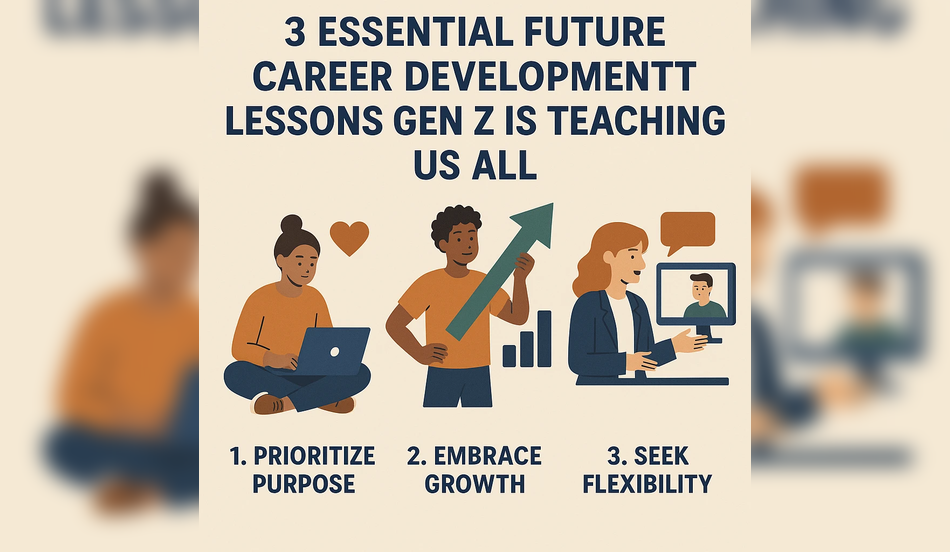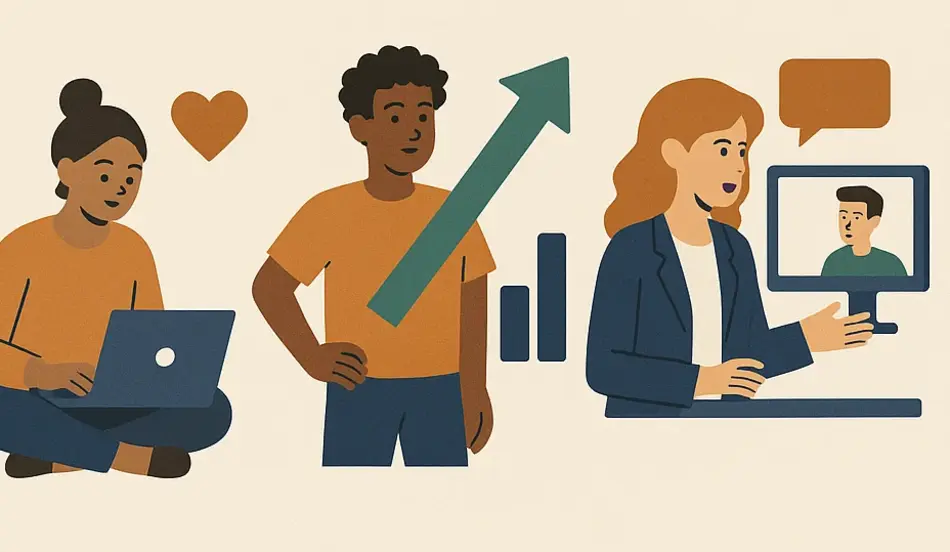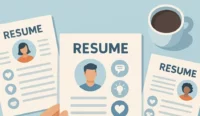Introduction: Rethinking Career Success in a Rapidly Changing World
In today’s dynamic workplace landscape, traditional notions of career advancement are being fundamentally challenged. Understanding future career development means questioning established norms about work commitment, productivity measurement, and career progression. While many articles criticize younger generations for their approach to work, this perspective misses a crucial opportunity: learning from Generation Z about how careers are evolving and what skills will truly matter in the coming decades.
The insights from younger workers aren’t signs of laziness or entitlement—they’re early indicators of profound shifts in how careers will function in our increasingly decentralized, autonomous, and purpose-driven economy. By examining these shifts closely, professionals of all generations can better position themselves for future career development that aligns with emerging workplace realities.
What Gen Z Can Teach Us About Future Career Development
1. The Evolving Meaning of Jobs in a Decentralized Economy
The phenomenon of “rage quitting”—where employees abruptly leave their positions, sometimes documenting the moment on social media—has generated significant controversy. Many established professionals view this behavior as unprofessional and disrespectful. However, looking deeper, this trend reveals important insights about future career development in an increasingly decentralized work environment.
The Shift from Jobs to Skills Application
For Generation Z, a job itself isn’t the primary source of meaning or identity. Instead, they prioritize how their unique skills can be applied to solve problems. This represents a fundamental shift in future career development thinking:
- Traditional approach: Follow a predetermined career path within an organization
- Emerging approach: Apply personal skills in environments where they create maximum value
New Leadership Requirements
This shift demands a transformation in leadership styles. Effective leaders in this new paradigm:
- Act as mentors rather than bosses
- Present problems to solve rather than tasks to complete
- Provide autonomy while offering guidance when requested
- Ask what resources team members need rather than dictating processes
Personal Brand Over Job Loyalty
While younger workers may seem less attached to specific jobs, they understand the importance of maintaining personal reputation in an interconnected world. Their future career development strategy acknowledges that:
- Professional networks extend beyond current employers
- Online presence creates a permanent record of work behavior
- Personal values and consistency matter more than longevity at a single company
As Harvard Business Review reports, this shift toward values-based career decisions was accelerating even before the pandemic, with workers increasingly seeking alignment between personal values and organizational culture.
2. Redefining Hard Work for Meaningful Impact
The notion that dedication to work equals time spent has become increasingly outdated in modern future career development. Generation Z understands that impact and results matter more than hours logged—a perspective that’s transforming how we measure productivity and success.
Time vs. Impact: A New Productivity Paradigm
The traditional equation of hours worked with productivity is being challenged:
- Traditional metric: Time dedicated to tasks
- Emerging metric: Impact and outcomes achieved
This doesn’t mean structured work hours are disappearing entirely. Many essential roles—from healthcare to education to retail—still require consistent time commitments. However, for knowledge work and creative fields, the correlation between hours and output is increasingly tenuous.
Celebrating Efficiency and Creativity
Forward-thinking organizations are adapting their future career development frameworks to:
- Reward efficiency rather than presenteeism
- Celebrate creative solutions regardless of time invested
- Focus performance reviews on outcomes rather than processes
- Allow flexibility when possible while maintaining accountability
According to Gallup’s workplace research, employees who feel their work is evaluated fairly based on output rather than hours show significantly higher engagement levels—a critical factor in retention and productivity.
Aligning Skills with Organizational Goals
The most successful professionals in this new paradigm excel at:
- Identifying how their unique abilities serve broader company objectives
- Communicating the value they create regardless of process
- Focusing on results rather than activity
- Continuously developing skills that increase their impact
3. The End of Linear Career Paths: Embracing Career 3.0
Perhaps the most profound shift in future career development is the move away from predetermined career ladders toward self-directed professional journeys. This parallels the evolution of the internet itself, from centralized information (Web 1.0) to social interaction (Web 2.0) to decentralized ownership (Web 3.0).
Understanding Career 3.0
The evolution of career development can be understood through similar phases:
- Career 1.0: Fixed paths within hierarchical organizations
- Career 2.0: More mobility between companies but still following industry norms
- Career 3.0: Decentralized, self-defined careers built around personal skills and meaning

The Challenge and Opportunity of Self-Definition
This shift creates both challenges and opportunities for future career development:
Challenges:
- Loss of external validation and clear success markers
- Increased responsibility for defining your own path
- Need for greater self-awareness and reflection
- Continuous adaptation to changing conditions
Opportunities:
- Authentic alignment between work and personal values
- Ability to leverage unique skill combinations
- Greater autonomy and control over professional life
- Potential for more meaningful and fulfilling work
Navigating a Self-Defined Career Path
To thrive in this new paradigm, professionals should:
- Invest time in understanding their unique skills and interests
- Seek projects and roles that allow authentic expression of these abilities
- Build diverse networks across industries and disciplines
- Develop strong self-management and entrepreneurial thinking
- Embrace continuous learning and adaptation
Research from McKinsey’s Future of Work study suggests that adaptability, self-direction, and continuous skill development will be the most critical factors in career success over the coming decade.
Embracing the Future of Work
The lessons from Generation Z about future career development aren’t about abandoning responsibility or commitment. Rather, they point toward a more authentic, impact-focused, and self-directed approach to building meaningful careers in an increasingly decentralized world.
By embracing these insights, professionals of all generations can:
- Focus on applying their unique skills to meaningful problems
- Measure success by impact rather than time invested
- Take ownership of defining their own career paths
- Align work with personal values and meaning
- Continuously adapt to changing conditions and opportunities
Preparing Your Skills for the Future
As traditional career paths evolve into more fluid journeys, developing the right skills becomes even more critical for future career development. Consider focusing on:
- Adaptability and learning agility
- Problem-solving and critical thinking
- Digital literacy across multiple platforms
- Communication across diverse teams and contexts
- Self-management and autonomous work capabilities
- Creativity and innovation
Find Your Next Career Opportunity
Ready to apply these insights to your own future career development? Explore thousands of opportunities across industries and roles on WhatJobs. From traditional positions to cutting-edge roles, find the perfect next step in your evolving career journey.
FAQs
How is future career development different for Generation Z compared to previous generations?
Future career development for Generation Z is characterized by greater autonomy, skill-focused rather than job-focused approaches, and self-defined measures of success. Unlike previous generations who often followed linear career paths within organizations or industries, Gen Z tends to prioritize applying their unique skills to meaningful problems, regardless of traditional career structures. They’re also more likely to value flexibility, purpose alignment, and continuous learning opportunities over conventional job security or hierarchical advancement.
What skills are most important for future career development in a decentralized work environment?
For successful future career development in decentralized work environments, several key skills stand out: self-management and autonomous decision-making, digital collaboration across distributed teams, adaptability to rapidly changing conditions, creative problem-solving without constant supervision, effective communication in virtual contexts, and personal brand management. Additionally, the ability to identify how your unique skills create value and to articulate that value to others becomes increasingly important when traditional job titles and structures carry less weight.
How can established professionals adapt their future career development approach based on these insights?
Established professionals can enhance their future career development by first conducting an honest assessment of their unique skills and strengths independent of job titles or roles. Next, they should consider how these skills create value in their current environment and where else they might be valuable. Developing greater comfort with ambiguity and self-direction is crucial, as is building broader networks beyond current employers or industries. Finally, focusing on continuous skill development—particularly in digital collaboration, autonomous work, and creative problem-solving—will help established professionals thrive in more decentralized work environments.
What does future career development success look like if traditional career paths are disappearing?
In the emerging paradigm of future career development, success becomes more personally defined rather than externally validated. Rather than climbing predetermined ladders, success might include: achieving impact alignment (where your work creates meaningful change in areas you care about), skill growth and mastery in your chosen domains, work-life integration that supports overall wellbeing, financial sustainability that supports your desired lifestyle, and the development of a professional reputation and network that creates ongoing opportunities. The key shift is from externally defined metrics to personally meaningful measures of professional fulfillment and impact.






